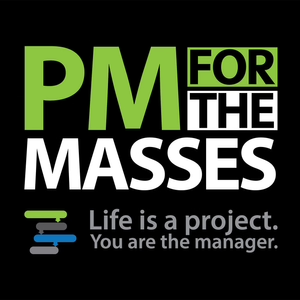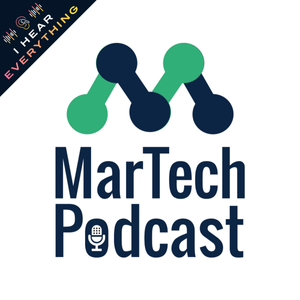
Freedom Dumlao: What 70 Java Services Taught Me About Focus
04/22/25 • 63 min
Freedom Dumlao (CTO at Vestmark) joins Robby to explore what it means to maintain software at scale—and why teams sometimes need to unlearn the hype.
With two decades of experience supporting financial systems, Freedom shares how his team manages a Java monolith that oversees $1.6 trillion in assets. But what’s most surprising? His story of how a team working on 70+ microservices rebuilt their platform as a single Ruby on Rails monolith—and started shipping faster than ever before.
Episode Highlights
[00:02:00] Why Respecting Legacy Code Matters
Freedom reflects on a lesson he learned at Amazon: "Respect what came before." He discusses the value of honoring the decisions of past developers—especially when their context is unknown.
[00:05:00] How Tests Help (and Where They Don’t)
Freedom discusses how tests can clarify system behavior but not always intent—especially when market logic or business-specific rules come into play.
[00:07:00] The Value of Understudies in Engineering
Freedom shares how his team intentionally pairs subject matter experts with understudies to reduce risk and transfer knowledge.
[00:09:30] Rethinking Technical Debt
He challenges the fear-based framing of technical debt, comparing it instead to a strategic mortgage.
[00:17:00] From 70 Services to 1 Monolith
At FlexCar, Freedom led an unconventional rewrite—consolidating 70 Java microservices into a single Rails app. The result? A dramatic increase in velocity and ownership.
[00:25:00] Choosing Rails Over Phoenix, Laravel, and Django
After evaluating multiple frameworks, Rails' cohesiveness, Hotwire, and quick developer ramp-up made it the clear winner—even converting skeptical team members.
[00:31:00] How Rails Changed Team Dynamics
By reducing dependency handoffs, the new Rails app enabled solo engineers to own complete features. The impact? Faster delivery and more engaged developers.
[00:36:30] Why Rails Still Makes Sense at a 20-Year-Old Company
Even with a large Java codebase, Vestmark uses Rails for rapid prototyping and new product development.
[00:41:00] Using AI to Navigate Legacy Systems
Freedom explains how his team uses retrieval-augmented generation (RAG) to surface relevant code—but also the limitations of AI on older or less common codebases.
[00:51:00] Seek Feedback, Not Consensus
Freedom explains why aiming for alignment slows teams down—and how decision-makers can be inclusive without waiting for full agreement.
Links and Resources
Thanks to Our Sponsor!
Turn hours of debugging into just minutes! AppSignal is a performance monitoring and error-tracking tool designed for Ruby, Elixir, Python, Node.js, Javascript, and other frameworks.
It offers six powerful features with one simple interface, providing developers with real-time insights into the performance and health of web applications.
Keep your coding cool and error-free, one line at a time!
Use the code maintainable to get a 10% discount for your first year. Check them out!
Subscribe to Maintainable on:
Or search "Maintainable" wherever you stream your podcasts.
Keep up to date with the Maintainable Podcast by joining the newsletter.
Freedom Dumlao (CTO at Vestmark) joins Robby to explore what it means to maintain software at scale—and why teams sometimes need to unlearn the hype.
With two decades of experience supporting financial systems, Freedom shares how his team manages a Java monolith that oversees $1.6 trillion in assets. But what’s most surprising? His story of how a team working on 70+ microservices rebuilt their platform as a single Ruby on Rails monolith—and started shipping faster than ever before.
Episode Highlights
[00:02:00] Why Respecting Legacy Code Matters
Freedom reflects on a lesson he learned at Amazon: "Respect what came before." He discusses the value of honoring the decisions of past developers—especially when their context is unknown.
[00:05:00] How Tests Help (and Where They Don’t)
Freedom discusses how tests can clarify system behavior but not always intent—especially when market logic or business-specific rules come into play.
[00:07:00] The Value of Understudies in Engineering
Freedom shares how his team intentionally pairs subject matter experts with understudies to reduce risk and transfer knowledge.
[00:09:30] Rethinking Technical Debt
He challenges the fear-based framing of technical debt, comparing it instead to a strategic mortgage.
[00:17:00] From 70 Services to 1 Monolith
At FlexCar, Freedom led an unconventional rewrite—consolidating 70 Java microservices into a single Rails app. The result? A dramatic increase in velocity and ownership.
[00:25:00] Choosing Rails Over Phoenix, Laravel, and Django
After evaluating multiple frameworks, Rails' cohesiveness, Hotwire, and quick developer ramp-up made it the clear winner—even converting skeptical team members.
[00:31:00] How Rails Changed Team Dynamics
By reducing dependency handoffs, the new Rails app enabled solo engineers to own complete features. The impact? Faster delivery and more engaged developers.
[00:36:30] Why Rails Still Makes Sense at a 20-Year-Old Company
Even with a large Java codebase, Vestmark uses Rails for rapid prototyping and new product development.
[00:41:00] Using AI to Navigate Legacy Systems
Freedom explains how his team uses retrieval-augmented generation (RAG) to surface relevant code—but also the limitations of AI on older or less common codebases.
[00:51:00] Seek Feedback, Not Consensus
Freedom explains why aiming for alignment slows teams down—and how decision-makers can be inclusive without waiting for full agreement.
Links and Resources
Thanks to Our Sponsor!
Turn hours of debugging into just minutes! AppSignal is a performance monitoring and error-tracking tool designed for Ruby, Elixir, Python, Node.js, Javascript, and other frameworks.
It offers six powerful features with one simple interface, providing developers with real-time insights into the performance and health of web applications.
Keep your coding cool and error-free, one line at a time!
Use the code maintainable to get a 10% discount for your first year. Check them out!
Subscribe to Maintainable on:
Or search "Maintainable" wherever you stream your podcasts.
Keep up to date with the Maintainable Podcast by joining the newsletter.
Previous Episode

Mercedes Bernard: Friendly Code Welcomes Everyone In
Mercedes Bernard, Staff Software Engineer at Kit, joins Robby to talk about what it really means to write code that lasts—and who it should be written for.
In this episode of Maintainable, Mercedes shares a thoughtful and practical perspective on working with legacy codebases, managing technical debt, and creating a team culture that values maintainability without fear or shame. Her guiding principle? Well-maintained software is friendly software—code that is understandable and approachable, especially for early-career developers.
Together, they discuss how to audit and stabilize older systems, avoid full rewrites, and create consistent developer experiences in large applications. Mercedes reflects on her decade in consulting and how that shaped her approach to navigating incomplete documentation, missing historical context, and multiple competing patterns in a codebase. She breaks down different types of technical debt, explains why not all of it is inherently bad, and offers strategies for advocating for maintenance work across engineering and product teams.
The conversation also touches on architecture patterns like job fan-out, measuring performance regressions, reducing infrastructure load, and building momentum for improvements even when leadership isn’t actively prioritizing them.
If you’ve ever felt overwhelmed by a messy project or struggled to justify maintenance work, this episode will leave you with a fresh mindset—and a few practical tactics—for making code more sustainable and inclusive.
Episode Highlights
[00:01:08] Defining Well-Maintained Software
Mercedes explains her top metric: software that feels friendly, especially to early-career developers navigating the codebase for the first time.
[00:03:00] What Friendly Code Actually Looks Like
She shares why consistency, discoverability, and light documentation (like class comments or UML snippets) can make a huge difference.
[00:05:00] Assessing Code Like a House Tour
Mercedes introduces her metaphor of giving a house tour to evaluate code: does everything feel like it’s in the right place—or is the stove in the cabinet?
[00:06:53] Consulting Mindset: Being a Guest in the Codebase
With a decade of consulting experience, Mercedes shares how she navigates legacy systems when historical context is long gone.
[00:10:40] Stabilizing a Startup’s Tangled Architecture
She walks through an in-depth case study where she helped a client with multiple abandoned services get back to stability—without a rewrite.
[00:17:00] The Power of a One-Line Fix
Mercedes shares how a missing check caused a job to fan out 30 million no-op background jobs a day—and how one line of code reduced that by 75%.
[00:23:40] Why State Checks Belong Everywhere
She explains how defense-in-depth patterns help avoid job queue flooding and protect system resources early in the fan-out process.
[00:24:59] Reframing Technical Debt
Not all debt is bad. Mercedes outlines three types—intentional, evolutionary, and time-based—and how to approach each one differently.
[00:28:00] Why Teams Fall Behind Without Realizing It
Mercedes and Robby talk about communication gaps between engineers and product stakeholders—and why it’s not always clear when tech debt starts piling up.
[00:34:00] Quantifying Developer Friction
Mercedes recommends expressing technical debt in terms of lost time, slow features, and increased cost rather than vague frustrations.
[00:42:00] Getting Momentum Without Permission
Her advice to individual contributors: start small. Break down your frustrations into bite-sized RFCs or tickets and show the impact.
[00:45:40] Letting the Team Drive Standards
Mercedes encourages team-led conventions over top-down declarations, and explains why having any decision is better than indecision.
[00:47:54] Recommended Reading
She shares a surprising favorite: The Secret Life of Groceries, a systems-thinking deep dive into the grocery industry by Benjamin Lorr.
Resources & Links
- 🧠 Mercedes Bernard’s website
- 🛠 Kit
- 📘 The Secret Life of Groceries by Benjamin Lorr
- 🔎
If you like this episode you’ll love
Episode Comments
Generate a badge
Get a badge for your website that links back to this episode
<a href="https://goodpods.com/podcasts/maintainable-333012/freedom-dumlao-what-70-java-services-taught-me-about-focus-89885030"> <img src="https://storage.googleapis.com/goodpods-images-bucket/badges/generic-badge-1.svg" alt="listen to freedom dumlao: what 70 java services taught me about focus on goodpods" style="width: 225px" /> </a>
Copy




